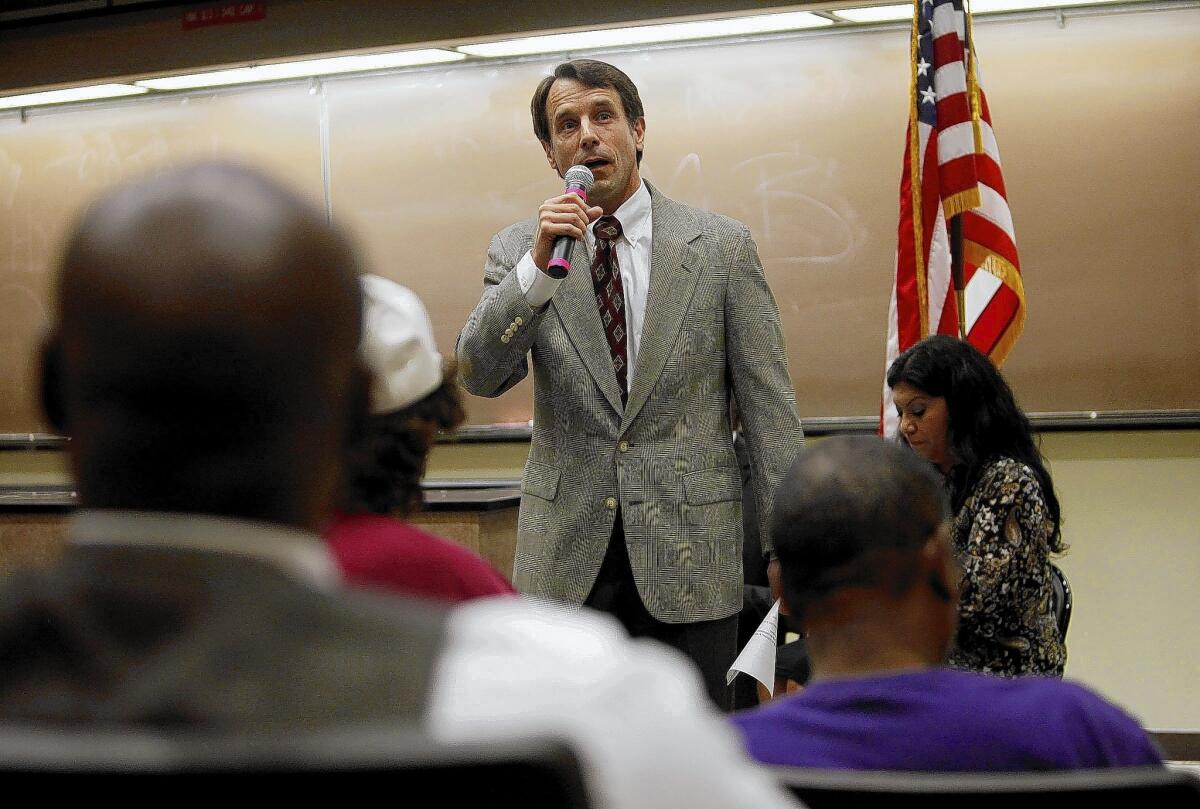Regulating state’s health premiums could hurt exchange, report says

Obamacare in California could suffer setbacks, delays and legal challenges if voters this year approve a statewide ballot initiative to regulate insurance rates, a new industry-backed report warns.
Those predictions drew immediate fire from Insurance Commissioner Dave Jones. He said the concerns are nonsense and passage of the ballot measure is essential for consumers to reap the full benefits of the Affordable Care Act.
For two years, Jones and consumer groups have campaigned for more authority over ever-increasing health premiums for consumers and small businesses. In November, voters will decide whether to give the insurance commissioner veto power over rate hikes.
The latest dust-up stems from a report being issued Thursday by health insurers and other business groups opposing the ballot measure.
The report’s author, the former head of the Massachusetts health exchange and an adviser to the Obama administration on the Affordable Care Act, said passage of the ballot initiative would conflict with California’s new health exchange, which exceeded expectations in signing up 1.4 million people in its first year.
In particular, consultant Jon Kingsdale zeroed in on a provision of the initiative that would give outside groups the opportunity to legally challenge rates under consideration by the insurance commissioner.
The prospect of lengthy legal wrangling could severely disrupt the ability of the Covered California exchange to negotiate premiums with health plans and meet its deadlines for open enrollment, Kingsdale said.
“Trying to overlay these two conflicting approaches at the same time is highly problematic,” Kingsdale said in an interview. “There’s nothing like this in any other state.”
If an insurer couldn’t get rates approved on a timely basis, he said, it could be shut out of the exchange for an entire year. The overall uncertainty could make it difficult to calculate federal subsidies for consumers because they are pegged to the range of prices in the exchange.
Jones and other backers of the ballot measure say those concerns are exaggerated. Big insurers hold too much market power, they said, for Covered California alone to protect consumers from excessive premiums. The state’s four largest health insurers account for 94% of Covered California’s enrollment through mid-April.
“Because of that concentration in the market, the exchange doesn’t have enough buying power to drive rates down,” Jones said. “This consultant’s report has been bought by health insurers who are dead set against any public scrutiny that could rein in excessive rate increases.”
Health insurers are gearing up for an expensive fight.
They have already contributed $25.4 million to defeat the ballot initiative through a group called Californians Against Higher Healthcare Costs, state records show. Industry giant WellPoint Inc., which runs Anthem Blue Cross, has led the way by giving $12.8 million.
A spokeswoman for the industry group said Kingsdale’s firm, Wakely Consulting Group, was paid $50,000 for the report. Kingsdale and his firm have done previous consulting work for Covered California and other states on exchange issues.
Larry Levitt, a senior vice president at the nonprofit Kaiser Family Foundation, said the report raises legitimate concerns.
“Some really difficult operational issues would need to be worked out if this passed,” Levitt said. “There is the potential for chaos if interests collide.”
Covered California’s executive director, Peter Lee, said his agency won’t be taking a position for or against the ballot measure. But he said the exchange is expected to finish its review of the potential impacts from the ballot measure next month.
“We haven’t determined what its implications would be,” Lee said. “If this process means some plans are not on the shelf for open enrollment that would not be of benefit to the consumer.”
Consumer Watchdog, a Santa Monica advocacy group, collected the signatures to get the rate regulation measure on the ballot this fall.
It also was the organization that championed Proposition 103, the 1988 ballot measure that gave the insurance commissioner authority over property and casualty insurance rates and established the process for outside groups like itself to intervene. This year’s ballot measure would give the insurance commissioner similar power over proposed health insurance rates.
Consumer Watchdog says it has saved Californians $2.9 billion since 2002 by successfully disputing rate hikes for property and casualty insurance under Proposition 103. It has raised about $2 million for its campaign.
Kingsdale, the consultant, said well-intentioned consumer groups aren’t the only ones that could seize on the ability to intervene in the ratemaking process.
“Opponents of the Affordable Care Act could routinely intervene to bring the whole annual open enrollment to a grinding halt,” Kingsdale said. “It’s a devilishly clever way to muck it up.”
Harvey Rosenfield, founder of Consumer Watchdog, scoffed at those concerns.
“The more likely threat to the exchange is an asteroid hitting their building rather than these conspiracy theories,” Rosenfield said.
In his review, Kingsdale examined property and casualty rate filings in California between 2005 and 2011. He identified 86 filings in which a third party intervened in the case, and it took nearly a year, on average, to reach a final resolution of those matters.
Jones disputed those figures and he said challenges are relatively rare. He added that his department is fully capable of meeting the exchange’s deadlines.
Twitter: @chadterhune







